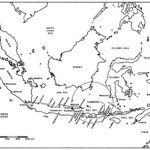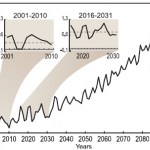Climate
... you could be in for a surprise. If, that is, you're not up on the latest climate research. Figuring out what role the forests will play in the Earth's climate regulating mechanisms have long proved more than a little tricky. And it just keeps getting more complicated.
Back at the turn of the century, for example, it was widely assumed that heavily forested countries would be in an enviable position when it comes to calculating net carbon emissions. Canada went to Kyoto negotiations in 2001 arguing that it should get credit for maintaining its vast boreal forests, because "everyone knows…
It's Earth Day, so in the spirit of celebration, instead of dwelling on the bad news (like the report that 9 out of 10 attendees at the recent Copenhagen scientific conference on climate change don't expect us to be able to avoid increasing the planet's average temperature by a "dangerous" 2°C -- I said I wouldn't dwell, but I reserve the right to mention), let's consider things from an optimist's point of view.
Which optimist should we choose? How about New York Times columnist John Tierney? Not because he's a particularly well-regarded climatologist. He's not even a scientist at all. Like…
The latest report from the Pew Forum provides yet more evidence that the culture wars are more than an amusing abstraction for social scientists. Here's the question, asked of 1502 Americans:
From what you've read and heard, is there solid evidence that the average temperature on Earth has been getting warmer over the past few decades, or not? [If "yes," ask]: Do you believe that the earth is getting warmer... 1 - Mostly because of human activity, such as burning fossil fuels, OR 2 - Mostly because of natural patterns in the earth's environment? [options rotated]
And here are the results,…
You may recall Sarah Palin's curious approach to the science of climate change. Although while running for vice-president of the United States she insisted humans were not responsible, she nevertheless advocated doing something about it. This week Alaska's governor offered some details of just what we should do.
In a speech delivered on the occasion of a visit by Interior Secretary Ken Salazar to her state, she said:
Some would have you delay exploration and development in the federal offshore of Alaska over concerns related to global warming and its effects in the Arctic. First of all let me…
Fred Pearce, whose byline is most commonly seen in New Scientist over feature stories about climate change, has done a little bit of thinking about whether we should be worried about the virtual certainty that the world's population will hit 9 billion before it starts to fall in the second half of this century. His verdict? While still a serious problem when it comes to the evils of poverty, overpopulation will have little bearing on our efforts to deal with global warming.
The title of his piece in Yale's e360 pretty much says it all: "Consumption Dwarfs Population
As Main Environmental…
A new paper to be published next week in Geophysical Research Letters (which really needs a better name) lays out what kind of effort would be required to reduce the impacts of climate change by half. Actually, what it does is conclude that if we reign in our fossil-fuel emissions by 70%, temperature rise and a few other consequences will be roughly half of what they'd be in the absence of any mitigating effort. But since both targets are arbitrary, it doesn't really matter which way you approach the subject.
Either way, the news ain't good.
In "How much climate change can be avoided by…
Tambora, Indonesia
There are big eruptions, then there are big eruptions. On April 10, 1815, Tambora, a volcano in Indonesia, produced one of the largest eruptions in human history. This eruption produced what became known as the "year without a summer" after the volcanic aerosols from the eruption produced some of the coldest summers in many parts of the world. The Tambora eruption in 1815 was a VEI 7, on a scale that goes to, well, 7*, putting it in a class of some of the largest and most violent eruptions imaginable - and I, for one, can hardly imagine what might happen if an eruption of…
And now, in another edition of "I was going to ignore this, but," I draw your attention to the latest career move of one Marc Morano and his unwavering campaign to undermine public support for any and all policies that might give us a chance to forestall catastrophic climate change
I was hoping that Morano, the former pseudo-journalist who first rose to prominence by serving as chief propagandist for the Swift Boat veterans who helped defeat John Kerry's presidential bid in 2004, would just go away after leaving the employ of Republican Sen. James "global warming is a hoax" Inhofe a few weeks…
Back when I was an editor of a small-town community weekly, I had a bumper sticker affixed to one of my office walls with a simple message: "ASSUME NOTHING." One of my predecessors had left it behind. I really should get a new one because, like even the best journalists and bloggers, I need to be reminded of that cardinal rule, and regularly.
Back in January, I posted a rebuttal to Michican columnist John Tomlinson's hopelessly misinformed attempt to debunk anthropogenic climate change. In my post, I repeated an error Tomlinson made by referring to the "Arctic Climate Research Center" at the…
I was going to ignore the open letter-to-the-president advertisement placed in major papers recently by the Cato Institute. You've probably heard of it -- the one that says Obama should ignore global warming alarmism because the science says it isn't happening. The one signed by "over 100 scientists." But the response elsewhere has been interesting. It focuses almost exclusively on the expertise of those who signed the letter, not the merits of the argument it makes. I find myself agreeing -- ever so slightly, with the Cato Institutes' Jerry Taylor, who defended the letter last week in the…
Very few relationships in this world are monotonic. Not the price of stocks, not the traffic on this blog, and not global climate trends. Maybe if more people understood this, we'd have less nonsense about climate change clogging the media.
By monotonic, I mean, if you plot a trend on a standard x-y graph, monotonic lines will always go in the same direction, whether it's up, down or flat, no matter what the scale. The fact that most functions aren't monotonic should be obvious to anyone who thinks about it for a while. The real world has a habit of being a little wonky. Even those things…
Image courtesy of AVO/USGS by Cindy Koplin showing the ash fall in Homer, AK on 4/4/09
Not much new to report about the eruption at Redoubt beyond the fact that it continues. AVO has kept the warning level at Red/Warning after briefly dropping it to Orange/Watch on Friday night. The 15,000 foot / 5 km-tall plume on Sunday was mostly water and volcanic gases. Eagle-eyed observers also noticed a plume on the lower flanks on the north side of the volcano that is believed to be steam generated by block & ash flows interacting with snow or water. These flow block & ash flows are coming…
"I'm not an expert on any of these things. Much of what I say should be taken with a grain of salt."
So said Freeman Dyson, Professor Emeritus at Princeton's Institute for Advanced Physics, all-round brilliant scientist, and self-professed global warming "heretic," during a round of questions and answers following his talk Tuesday night at Furman University in Greenville, S.C. "I am not speaking to you as a scientist, but as a story-teller ... of science fiction."
So why then, I asked, should we pay attention to what you have to say on climate change, considering that those who are experts in…
I was wrong. Indeed, it would seem I've been laboring under a misapprehension for the last couple of decades. Anthropogenic global warming is, after all, a fraud, a colossal scheme designed to subvert the very foundations of modern civilization in a favor of a socialist world government that controls every aspect of our lives down to the air fresheners in our bathrooms.
How have I come to this conclusion, one that I will admit is in direction contradiction to just about everything I have written on the subject since the late 1980s? It wasn't any one piece of evidence. Rather, it's more like I…
Freeman Dyson is on the cover of yesterday's New York Times Magazine. Inside a baseball writer (a very good baseball writer, but still) gives the man an opportunity to explain why he doesn't believe climate change is something to worry about.
Others have lamented the attention devoted by the nation's leading newspaper to the thoughts of someone who has no expertise in the field. I share Chris Mooney's reservations about the writer's understanding of the way scientific skepticism is supposed to work. But Dyson cannot be easily dismissed if for no other reason than he has proven himself to be…
Among the more interesting questions asked in the the just-released Yale poll on "Climate change in the American mind"is the one that shows us how much the country trusts various sources of information on the subject. Keeping reading to find out who tops the list, and who is on the bottom:
That is, as the Dane said, the question.
The short answer is "nobody knows," of course. The ice core records suggest that we're adding CO2 to the atmosphere faster than the planet has ever seen before. That doesn't necessarily mean that the consequences of doing so ;;;; planetary warming and extreme drought in dry areas, for example ;;;; will be felt soon, or at all. But in the past, such consequences sooner or later come about. And it would be foolish to operate on the assumption that the Earth has some of kind of hitherto undiscovered compensatory mechanism that spares us from them.
Which…
A story on the fate of Greenland's ice sheet published last week in The Guardian attracted the expected level of interest from those who uncritically repeat any scientific tidbit that reminds us we still don't know everything we need to know about climate change. This was because the story, as written, implied the ice sheet isn't as sensitive to global warming as is popularly thought.
Something about the story didn't seem exactly right to me, though. For one thing, it was based not on a peer-reviewed paper but a presentation to the recent scientific meeting on climate change in Copenhagen.…
Elizabeth Kolbert's interview in Yale's e360 magazine is a sobering read. But what's even more interesting than the light she sheds on the reasons why the polls keep finding the public is out of touch with the science is the stark reminder I came across in the article's comment section that we've blown the last quarter century.
Greenpeace has posted a PDF of a 1983 New York Times story that, with only minimal edits of a few numbers -- replace the carbon-dioxide concentration, which was 340 ppm back then, with today's 387 -- could easily run today. I've converted the whole thing to HTML and,…
Here in DC, creative individuals appear to have revised Chevron ads in at least one Metro station to reflect a more, er, politically overt sentiment. The poster hack changes the promise "I will use less energy" in this ad (pdf) to "I will stop lobbying against climate legislation."
The digitally executed revision (which looks pretty convincing in person) follows in the footsteps of Berlin graffiti artists and others who use graphic hacks to subtly shift, reverse, or critique advertising in public places. The question is, how many people have noticed? (Keep your eyes open, DC residents!)


